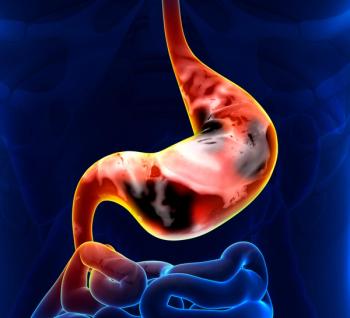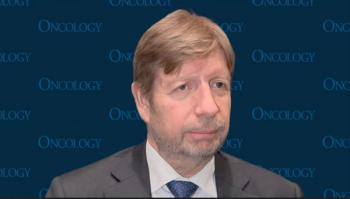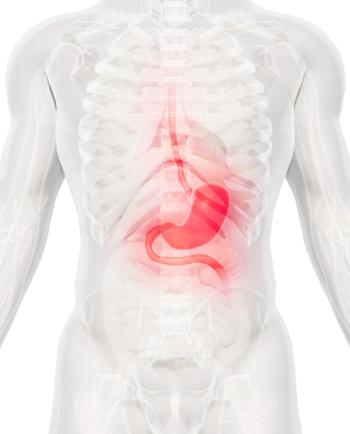
TAS-102 Prolongs Survival in Metastatic Gastric, GEJ Adenocarcinoma
TAS-102 improved overall survival, compared with placebo, in patients with metastatic gastric or gastroesophageal junction (GEJ) cancer.
TAS-102 (trifluridine/tipiracil; FTD/TPI; Lonsurf) improved overall survival (OS), compared with placebo, in patients with metastatic gastric or gastroesophageal junction (GEJ) adenocarcinoma, regardless of prior gastrectomy, according to findings from the phase 3 TAGS study published in JAMA Oncology.
In patients with prior gastrectomy, OS (6.0 months vs 3.4 months; HR, 0.57; 95% CI, 0.41-0.79) and progression-free survival (PFS; 2.2 months vs 1.8 months; HR, 0.65; 95% CI, 0.49-0.85) were more favorable among the TAS-102 group versus those on placebo.
Moreover, the patients who did not have gastrectomy also showed OS (HR, 0.80; 95% CI, 0.60-1.06) PFS (HR, 0.65; 95% CI, 0.49-0.85) benefit to treatment with TAS-102.
“In our detailed subgroup analysis of the TAGS study, patients who had undergone partial or total gastrectomy experienced improvement in OS after receiving FTD/TPI treatment,” the researchers concluded. “Patients who had not undergone gastrectomy also had improved OS after receiving treatment with FTD/TPI, but this benefit was more pronounced in the gastrectomy subgroup in these analyses, the reasons for which remain unclear.”
The pre-planned subgroup analysis of the randomized, double-blind, and placebo-controlled study focused on patients with metastatic gastric or GEJ cancer who had received at least 2 chemotherapy regimens previously. The patients were enrolled from 110 academic hospitals in 17 countries between 2016 and 2018 as part of the TAGS study. Of the 507 randomized patients, 221 had undergone gastrectomy, while 286 had not. Both groups were randomized at a 2:1 ratio to receive 35 mg/m TAS-102 2 times a day, or placebo.
The primary end point was OS, while secondary objectives were PFS, safety, and tolerability.
Adverse events (AEs) affected a majority of patients treated with TAS-102, with grade 3 or higher events occurring in 84.1% of the gastrectomy group and 76.3% of the non-gastrectomy group. The most common AEs in the gastrectomy and non-gastrectomy group included neutropenia (44.1% vs 26.3%, respectively), anemia (21.4% vs 17.4%), and leukopenia (14.5% vs 5.3%).
The authors concluded that the study showed a viable new treatment option for tough cases of disease. “Trifluridine/tiparicil is a safe and effective treatment option for patients with pretreated metastatic gastric or gastroesophageal junction cancer regardless or previous gastrectomy,” they wrote. “These results support the use of FTD/TPI among patients who have undergone gastrectomy, particularly in the context of the recent approval of FTD/TPI for patients with previously treated mGC/GEJC.”
Based on the primary analysis, the FDA approved TAS-102 in February 2019 for the treatment of adult patients with metastatic gastric or GEJ adenocarcinoma previously treated with at least 2 prior lines of chemotherapy that included a fluoropyrimidine, a platinum, either a taxane or irinotecan, and if appropriate, HER2/neu-targeted therapy.
"Metastatic gastric cancer and gastroesophageal junction adenocarcinoma are debilitating diseases that generally have a very poor prognosis," Taiho Oncology, Inc. senior vice president and chief medical officer Martin J. Birkhofer, MD, said in a press release. "Given the unmet treatment need and sense of urgency once earlier rounds of therapy have failed, we are pleased with the results of the subgroup analysis of the TAGS trial, which provide further evidence for the clinical benefit of LONSURF in these vulnerable patients with gastrectomy."
References:
Ilson DH, Tabernero J, Prokharau A, et al. Efficacy and safety of trifluridine/tipiracil treatment in patients with metastatic gastric cancer who had undergone gastrectomy: subgroup analyses of a randomized clinical trial. [published online October 14, 2019]. JAMA Oncol. 2019. doi: 10.1001/jamaoncol.2019.3531.
Newsletter
Stay up to date on recent advances in the multidisciplinary approach to cancer.



































